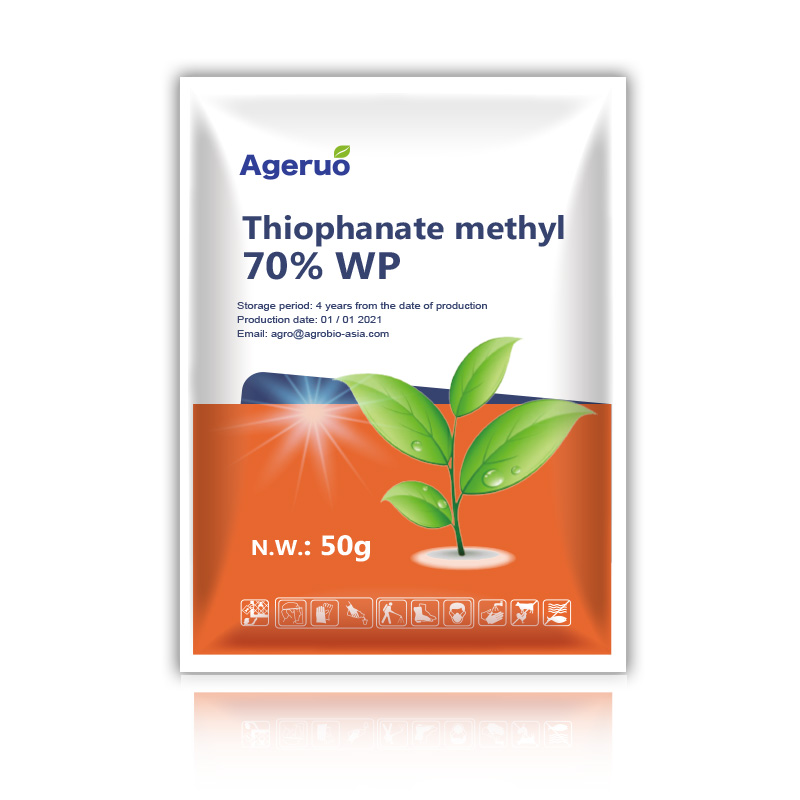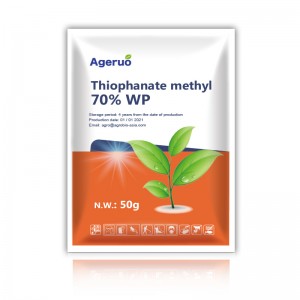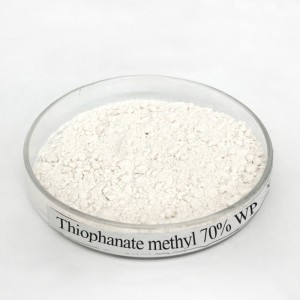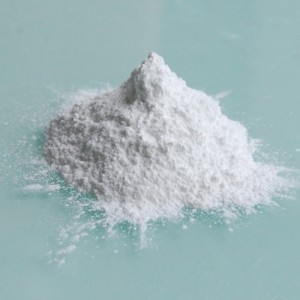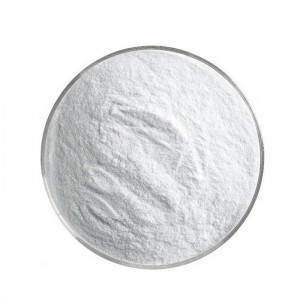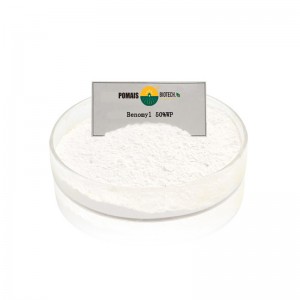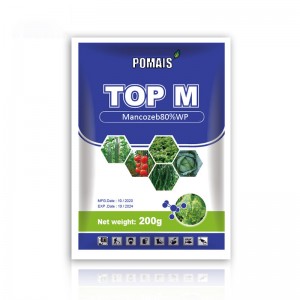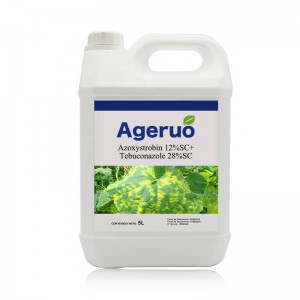Products
POMAIS Fungicide Thiophanate-Methyl 70% WP Fungicide | Agrochemical
Introduction
| Field | Value |
|---|---|
| Active / Strength | Thiophanate-methyl 70% WP |
| Chemistry / FRAC | Benzimidazole — FRAC 1 |
| Activity | Systemic; preventive & curative (label-dependent) |
| Target | Broad-spectrum fungal diseases in registered crops |
| CAS / Formula | 23564-05-8 / C12H14N4O4S2 |
| State | Wettable powder (WP) |
| Documentation | COA / MSDS (SDS) / TDS |
| Shelf Life | 2 years (standard storage; see label/SDS) |
You are selecting a single, high-strength solid formulation engineered for field reliability. Thiophanate-methyl 70% WP is positioned for preventive and curative programs in registered crops and use sites. The WP format disperses in water under proper premix/agitation and supports consistent sprayability, warehouse stability, and international shipping. Claims, sites, and intervals are label-dependent for your market; this page covers 70% WP only (no rates disclosed).
Mode of Action
You interrupt fungal cell division at the source. Thiophanate-methyl is metabolized in plants to carbendazim (MBC), which binds β-tubulin and disrupts spindle formation during mitosis. Growth of susceptible pathogens halts quickly; visible suppression and lesion arrest follow under favorable conditions. Because benzimidazoles are FRAC 1 and have documented resistance in some regions, align with FRAC rotation (alternate with different FRAC groups) and keep good records. Use only on fungal diseases; this chemistry does not target bacteria.
Target Diseases & Use Areas
You address a wide range of fungal diseases across field and horticultural crops. Typical labels cover powdery mildew, anthracnose, leaf spot/leaf blight complexes, scab, brown spot, gray mold, sheath diseases, and others—subject to local registration. Use areas can include cereals, rice, soybeans, fruit trees, vegetables, ornamentals, and managed turf/athletic fields where permitted. Final crop/disease lists, PHI/REI, and application windows must follow your local label.


Application Principles
You run the program by the book to protect workers, crops, and efficacy.
-
Time applications to label-specified crop stages and disease risk windows; integrate with scouting.
-
Ensure uniform coverage and continuous agitation; only use adjuvants/water-quality adjustments if the label allows.
-
Manage drift; stop in strong winds and protect adjacent sensitive areas.
-
Observe PPE/REI/PHI and local rules; document date, block, stage, conditions, and outcome.
-
Conduct a small-area check before broad deployment.
No rates or step-by-step procedures are provided here; the label governs.
Using Method
|
Crops |
Targeted Pests |
Dosage |
Using Method |
|
Apple |
Ring streak disease |
800-1000 times liquid |
Spray |
|
Rice |
Sheath blight |
1500-2145 g/ha. |
Spray |
|
Peanut |
Cercospora leaf spot |
375-495 g/ha. |
Spray |
|
Wheat |
Scab |
1065-1500 g/ha. |
Spray |
|
Asparagus |
Stem blight |
900-1125 g/ha. |
Spray |
|
Citrus tree |
Scab disease |
1000-1500 times liquid |
Spray |
|
Watermelon |
Anthrax |
600-750 g/ha. |
Spray |
Why 70% WP
You get high active load and operational simplicity without liquid-handling risk.
-
High-load solid reduces warehouse footprint and transport risk versus liquids.
-
Fast wetting/dispersion under correct premix and agitation; spray-equipment friendly.
-
Shelf & transit stability in original packaging; fewer leak-management concerns.
-
Clean documentation for import and audits (batch files line up with WP QC norms).
Quality & Stability
You receive batch-released product with auditable QC.
-
HPLC identity/assay plus routine physicals (wetting/dispersion, particle profile).
-
Cold/heat and freeze–thaw challenges to validate stability through logistics.
-
Store cool, dry, out of sunlight in original packaging. Typical shelf life: 2 years (see label/SDS).
-
Traceable lots with document packs facilitate distributor onboarding and inspections.
Packaging & OEM
You need packs that pass audits and move cleanly through your lanes.
-
Solid pack options (e.g., 1 kg / 500 g / 200 g; final sizes confirmed in quotation).
-
OEM private label with multilingual GHS panels, barcoding/QR, tamper-evident options; label templates and spec sheets provided.
-
MOQ: typically 500 kg aggregate per order; free samples available for qualification.
-
Forecast-based slotting; typical lead-time window: 20–30 days.
-
Cartonization & pallet patterns aligned to your route; export paperwork coordinated with your broker.
Regulatory & Stewardship
You keep the program defensible and effective.
-
Use only on label-listed crops/sites/diseases; follow PHI/REI, buffer zones, and water-protection statements.
-
Build FRAC-diverse rotations to slow resistance; never rely on a single MoA across cycles.
-
Manage containers/rinsates per local rules; maintain full application records.
-
Always follow the product label and local regulations. Risk = Hazard × Exposure.
FAQ
Is this page only about 70% WP?
Yes. All information here refers to Thiophanate-methyl 70% WP.
Do you offer other formulations?
Yes—36% SC, 500 g/L SC, 80% WG, 95% TC are available separately. This page remains focused on 70% WP.
Can I mix or rotate with other fungicides?
Only if the label permits. Follow FRAC rotation principles and run a small-area check first.
What documents ship with each lot?
A full COA/MSDS (SDS)/TDS pack plus batch QC summary; OEM label templates on request.
Lead time, MOQ, and samples?
Typical 20–30 days lead-time; MOQ 500 kg; free samples available for qualification.
Why Choose POMAIS
You want a supplier that de-risks compliance and supply. We combine auditable QC (HPLC release, stability challenges), OEM private label with multilingual artwork and traceability, and predictable production windows, so you can brief distributors quickly and hit seasonal launch dates.
Partner with POMAIS
Share destination market, crop portfolio, annual volume, preferred pack sizes, and destination port. We will return spec sheets, label templates, samples, MOQ & lead-time confirmation, and palletization notes aligned to your import lane.

